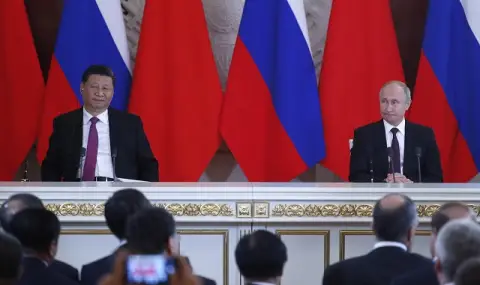One of the pressing issues of 2025 will be the expansion of the partnership between Beijing and Moscow, writes an editorial in the "Guardian" newspaper, quoted by BTA.
Almost three years have passed since Xi Jinping and Vladimir Putin declared a friendship "without borders" - weeks before Russia invaded Ukraine in February 2022. Since then, they have distanced themselves from this verbal enthusiasm. Talk of "limitless" friendship was quickly abandoned, probably at Beijing's request. When Putin visited China in May last year, he said that he and Xi Jinping were "close as brothers". The Chinese leader was more reserved, calling the Russian president a "good friend and a good neighbor". It is noteworthy that China does not call Russia its ally, as Putin does with regard to Beijing.
Nevertheless, the partnership between them continues to expand and deepen in the economic, political and military spheres, which worries the West. The American Council on Foreign Relations recently described this partnership as "the greatest threat to vital US national interests in sixty years". The past 12 months have seen unprecedented military cooperation between Chinese and Russian forces - although the aim has been more to draw attention to their combined power than to achieve the interoperability that underpins the US-European alliance.
The confrontation between the West and a China-Russia-led axis, in which Moscow is now the junior partner and which could include Iran and North Korea, is raising disturbing memories of the past. Old fears of nuclear war have been revived. An island - then Cuba, now Taiwan - could become a flashpoint.
But there is ample evidence that there are limits to the relationship between China and Russia, as the war in Ukraine has shown, notes the "Guardian". China is clearly reluctant when it comes to supplying arms and ammunition to Russia. Russian companies report growing obstacles as Chinese banks tighten rules in response to Western threats.
A look at the two sides’ security rhetoric seems to be as much about their combined power as it is about containing the other’s ambitions. Just as China’s support for Russia’s war in Ukraine has its limits, Russia has made it clear that it does not want to fight on China’s behalf.
Donald Trump’s return to the White House has raised expectations of a “Nixon in reverse”—a scenario in which the United States moves closer to Moscow and isolates China. Nixon’s move toward China was made possible by the extremely poor relations between China and the Soviet Union at the time. Both Russia and China have learned from this confrontation and are looking beyond one US presidential term.
China and Russia are coming together not because of ideology but because of interests and concerns, threats and opportunities. But these constraints create the ground for a more pragmatic and flexible relationship.
